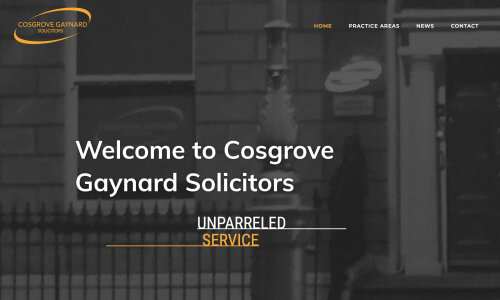Best Franchising Lawyers in Ireland
Share your needs with us, get contacted by law firms.
Free. Takes 2 min.
Or refine your search by selecting a city:
List of the best lawyers in Ireland
About Franchising Law in Ireland
Franchising in Ireland is a popular business model that enables individuals to operate a business under the brand and operational scheme of an established company. Although the franchise sector in Ireland contributes significantly to the economy, it operates under a combination of general commercial laws rather than being governed by specific franchise legislation. This means franchisors and franchisees must navigate business law, company law, and contract law, with their agreements defining the relationship.
Why You May Need a Lawyer
There are several common scenarios in which legal assistance in franchising is advisable:
- Understanding Franchise Agreements: These legally binding contracts often contain complex clauses that require careful examination.
- Negotiating Terms: Prospective franchisees may need help negotiating terms that are fair and conducive for both parties.
- Dispute Resolution: In the event of conflicts, legal counsel can assist in resolving disputes between franchisors and franchisees.
- Compliance and Regulatory Issues: A lawyer can help ensure compliance with all applicable local, national, and EU regulations.
- Drafting Legal Documents: Lawyers are essential in drafting, reviewing, and interpreting legal documents related to business operations.
Local Laws Overview
Franchising in Ireland is not regulated by specific franchise laws but is subject to a range of legal principles from other areas. Key aspects include:
- Contract Law: Franchise agreements fall under general contract law, demanding clear terms between franchisor and franchisee.
- Employment Law: Insight into employment contracts is crucial, particularly in understanding whether the franchisee is an independent contractor or an employee.
- Competition Law: Agreements must adhere to EU and Irish competition laws, forbidding anti-competitive behaviors.
- Consumer Protection Act: Franchised businesses must comply with consumer rights legislation.
- Intellectual Property Law: Protects the franchisor’s trademarks and other IP in the context of the franchise.
Frequently Asked Questions
What is the difference between a franchisor and a franchisee?
The franchisor owns the overarching company, trademarks, and business models, while the franchisee operates another branch of the business under the franchisor's brand and guidelines.
Do I need to register a franchise in Ireland?
There is no compulsory registration for franchises in Ireland. However, businesses must comply with the Company Registration Office if they incorporate as a company.
What is typically included in a franchise agreement?
Franchise agreements cover the rights and obligations of both parties, fees, intellectual property usage, training, and support, as well as termination conditions and dispute resolution mechanisms.
Can a franchise agreement be terminated early?
Termination depends on the contract terms. It typically includes provisions for termination by mutual agreement or breach of contract. Legal advice is recommended for navigating termination issues.
Are there financing options available for franchisees in Ireland?
Yes, franchisees can explore various financing options, including personal savings, bank loans, and franchise-specific loans, often arranged through the franchisor's networks.
What costs are involved in starting a franchise?
Costs can include an initial franchise fee, setup costs, marketing fees, and ongoing royalty fees. Legal costs for reviewing and setting up agreements are also a factor.
How are disputes between franchisors and franchisees typically resolved?
Most disputes are resolved through mediation or arbitration as stipulated in franchise agreements to avoid costly litigation.
Is it advisable to buy a franchise before seeking legal advice?
It is highly recommended that you seek legal advice before committing to ensure that you understand all contractual obligations and potential liabilities.
What happens if a franchisor goes out of business?
Franchisees might need to seek alternative suppliers or terminate the agreement. Legal guidance is crucial to understand rights and liabilities under these circumstances.
What measures ensure that a franchisor upholds their promises?
Franchise agreements outline the franchisor's responsibilities, and failure to uphold them can result in legal action. Regular communication and legal advice ensure compliance and enforcement.
Additional Resources
For further assistance and resources related to franchising in Ireland, consider engaging with the following organizations:
- Franchise Association of Ireland: Provides support and advocacy for franchise owners.
- Enterprise Ireland: Offers resources and guidance for entrepreneurs and business startups.
- Irish Franchise Magazine: Offers insights and news on the franchising industry.
- Law Society of Ireland: Can help locate qualified legal professionals specializing in franchise law.
Next Steps
If you need legal assistance with franchising in Ireland, consider the following steps:
- Consult the Law Society of Ireland to find a qualified solicitor experienced in franchising.
- Prepare all relevant documents and queries before meeting a lawyer to ensure a comprehensive and efficient consultation.
- Consider reaching out to franchise associations for advice and networking opportunities.
- Conduct thorough research and due diligence on a franchisor before entering a contractual agreement.
- Evaluate long-term business goals and financial forecasts to ensure the franchise opportunity aligns with your aspirations and capabilities.
Lawzana helps you find the best lawyers and law firms in Ireland through a curated and pre-screened list of qualified legal professionals. Our platform offers rankings and detailed profiles of attorneys and law firms, allowing you to compare based on practice areas, including Franchising, experience, and client feedback.
Each profile includes a description of the firm's areas of practice, client reviews, team members and partners, year of establishment, spoken languages, office locations, contact information, social media presence, and any published articles or resources. Most firms on our platform speak English and are experienced in both local and international legal matters.
Get a quote from top-rated law firms in Ireland — quickly, securely, and without unnecessary hassle.
Disclaimer:
The information provided on this page is for general informational purposes only and does not constitute legal advice. While we strive to ensure the accuracy and relevance of the content, legal information may change over time, and interpretations of the law can vary. You should always consult with a qualified legal professional for advice specific to your situation.
We disclaim all liability for actions taken or not taken based on the content of this page. If you believe any information is incorrect or outdated, please contact us, and we will review and update it where appropriate.
Browse franchising law firms by city in Ireland
Refine your search by selecting a city.















